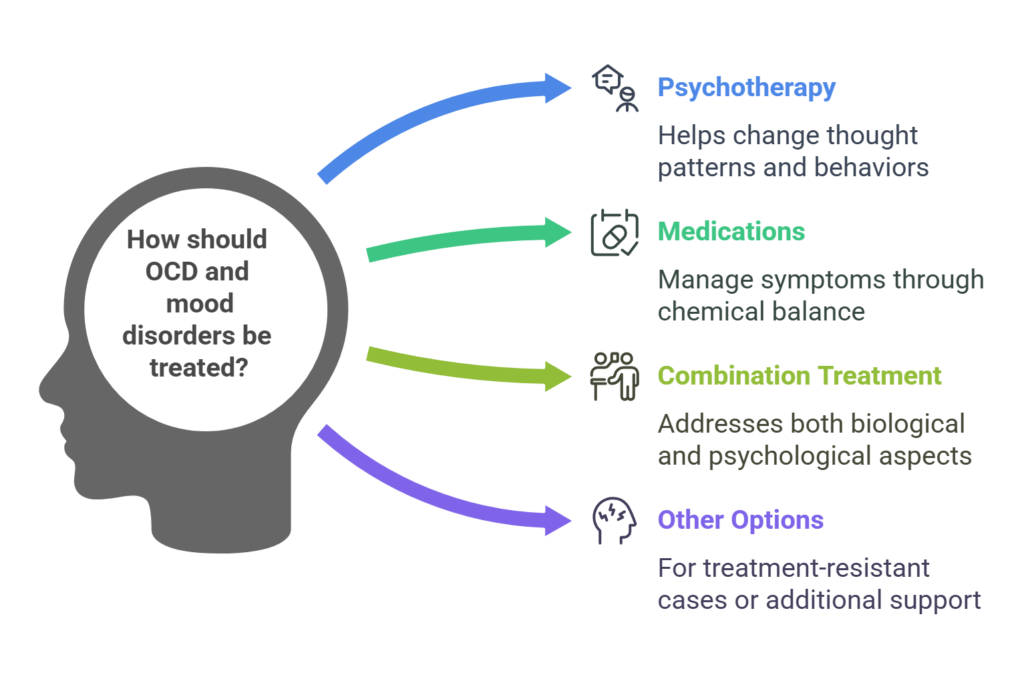Living with Obsessive-Compulsive Disorder(OCD) can feel like being trapped in a never-ending cycle of fear and anxiety. You might find yourself haunted by intrusive thoughts, compelled to perform rituals to silence the noise in your mind. This struggle can leave you feeling isolated and desperate for relief. As you grapple with the weight of your Obsession, a crucial question arises: is OCD a mood disorder? Understanding the answer can illuminate your path toward healing and provide clarity in your journey.
Many people mistakenly classify OCD as a mood disorder, but it is essential to recognize how it differs from conditions like depression. Let’s explore what OCD truly is, how it affects individuals, and its proper classification within the realm of mental health.
What is OCD?
OCD is a mental health condition marked by unwanted thoughts (obsessions) and repetitive behaviors (compulsions). People with OCD often feel compelled to perform certain actions to ease their anxiety. This cycle can significantly disrupt their daily lives.
Many believe that intrusive thoughts and compulsions relate to mood changes. However, these elements distinguish OCD from mood disorders. Mood disorders primarily affect emotional states, while OCD centers on anxiety and irrational thoughts. This leads us to the question: is OCD a mood disorder? The answer is no; it is classified as an anxiety disorder.
OCD symptoms can vary from person to person, but they generally fall into two categories: obsessions and compulsions.
OCD is characterized by compulsive and repetitive behaviors and thoughts, and many people with this condition report that their symptoms are disabling: they spend a number of hours accomplishing tasks that take other people just minutes to do. This begs the question: is OCD a mood disorder? No, it focuses on anxiety rather than mood.
Mood disorders are characterized by prolonged and severe changes in mood that interfere with normal life. These illnesses can cause a person to remain depressed, have feelings of worthlessness, or have chronic depression that can flip-flop into mania.
While OCD concerns thoughts or behaviors, all mood disorders are a direct concern with feelings. They may be mild and temporary or severe and chronic, affecting relationships, productivity, or health. This makes the difference in answering the question of whether OCD is a mood disorder. The answer remains clear: Today, OCD is recognized as a type of anxiety disorder.
Symptoms of mood disorders can include:
It is important to know about these symptoms in order to diagnose mood disorders that need dissimilar treatments from OCD. So, let me repeat my question in total: Is OCD a mood disorder? It is not.
It is for this reason that the causes of mood disorders can be known to be ill-defined and may involve a combination of a number of factors. Some contributing factors include:
These causes can be helpful in finding and understanding mood disorders, which would lead to a better solution. We must also recall that is OCD a mood disorder? The answer is still no.
When presenting the question, “Is OCD a Mood disorder?” one must examine the differences between OCD and such Mood disorders as depression or Bipolar disorder.
Mood disorders stem from changed moods, while OCD arises from anxiety and illogical ideas. Sufferers of mood disorders have chronic low mood or elevated mood swings, while OCD patients are controlled by obsessive ideas and repetitive actions.
This division is important in order to treat the disorders adequately because mood disorders and OCD need different kinds of therapy. Knowledge of these differences also answers another frequently asked question: is OCD a mood disorder? The answer also remains no.
If you or someone you love struggles with OCD or mood disorders, getting help is critical. Many treatments are available that limit symptoms and enhance the quality of life of people who suffer from allergies.

Here are some common treatment options for OCD and mood disorders:
These treatments are very important as they assist people in their day-to-day lives and help them struggle with diseases. These treatments are very important as they assist persons in their day-to-day lives as they struggle with diseases. As we reflect on the nature of OCD, we return to the question: is OCD a mood disorder? It is categorized under anxiety disorders, not under mood disorders.
FAQs
A: Despite the fact that it has depressive symptoms, OCD is far under anxiety disorders, not mood disorders. Instead of focusing on the significant changes of mood ongoing in mood disorders, it is characterized primarily by obsessive thoughts and compulsive behaviors resulting in anxiety.
A: They classify OCD as neither a personality disorder nor a mood disorder. It is a type of anxiety disorder that is marked by persistent unwanted thoughts and repetitive behaviors. Mood disorders act mainly on mood, while OCD is a category of anxiety disorders dealing with specific behaviors.
A: Despite this, however, OCD is not a subtype of bipolar disorder. Bipolar disorder, therefore, refers to the mood fluctuations involving depressive and hypo-manic mood states. The OCD, however, is characterized by persistent obsessions and compulsions that do not follow mood changes.
A: Mood disorder is an illness that is characterized by an abnormal and unusual state of mind. They include depressed mood, bipolar mood as well as other conditions such as anxiety, fear, panic, obsessive-compulsive disorder, post-traumatic stress disorder, and schizophrenia.
This is important for anyone who is experiencing any form of mental health disorder because failure to make the distinction between OCD and mood disorders is likely to complicate treatment significantly. You are not the only one experiencing that or has that condition; knowledge is the first step to healing. At Relevance Recovery, we believe that what you need is care and quality recovery that meets the unique complexities of your circumstances. Make that first move in the fight to regain control of your life. You must have the right to live a life without the responsibilities attached to OCD. Welcome To Healing, Make Your First Step Today!